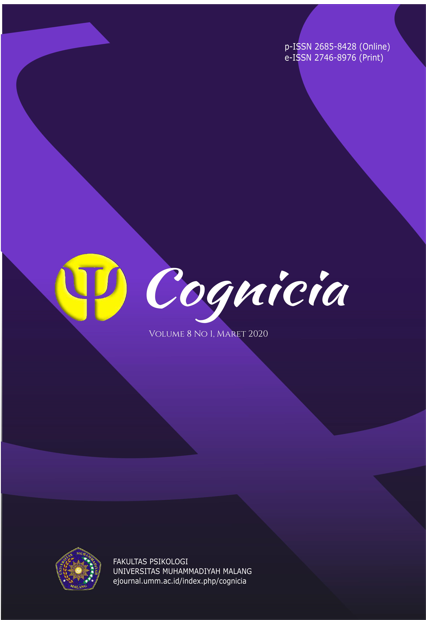Hubungan stres akademik dengan flow akademik pada mahasiswa
DOI:
https://doi.org/10.22219/cognicia.v8i1.11739Keywords:
Academic stress, academic flowAbstract
Students have various kinds of demands and obstacles on academic assignments that can make students experiencing academic stress. Academic stress make students feel uncomfortable, less focus, lack of concentration, and uncomfortable with academic activities which is called academic flow. The purpose of this was to determine the relationship between academic stress and academic flow in students. This research is a quantitative study with subjects being psychology students at the University of Muhammadiyah Malang 7st grade, and 174 subjects. The sampling technique used is nonprobability sampling, namely purposive sampling and analysis techniques using product moment correlation test with SPSS 24. The results of data analysis obtained the value of r = -,359, p = 0.000 (sig <0.01) meaning this study shows the relationship between the two variables and in accordance with the hypothesis that the higher the academic stress the lower the academic flow in students. Vice versa, the lower the academic stress, the higher the academic flow in students. The effective contribution of academic stress to academic flow is 12.9% and the remainder is 87.1%, influenced by other factors.Downloads
References
Alvin. (2007). Handling student’s stress. Jakarta: Gramedia.
Ansori, S. (2015). Pengaruh Adversity Quotient terhadap stres akademik pada mahasiswa. Skripsi Universitas Muhammadiyah Malang.
Azwar, S. (2012). Metode penelitian. Yogyakarta: Pustaka pelajar.
Bakker, A. B. (2005). Flow among music teachers and their students: The crossover of peak experience. Journal of Vocational Behavior.
Barseli, M., & Ifdil, I. (2017). Konsep stres akademik siswa. Jurnal Konseling dan Pendidikan.
Csikszentmihalyi, M. (2014). Applications Offlow in Human Development and Education. London: Springer dordrecht heidelberg.
Csikszentmihalyi, M. (1990). Flow: The Psychology of Optimal Experience. New York: Harper & Row.
Desmita (2010). Psikologi Perkembangan Peserta Didik cetakan ke-5. Bandung: Remaja Rosdakarya.
Furlong, J. M., Gilman, R., Heubner, E. S. (2009). Handbook of positive psychology in schools. Flow in schools revisited: cultivating engaged learners and optimal learning environment.
Goff, A.M. (2011). Stressor, accademic performance and learned resourcefulness in baccalaureate nursing students. International Journal of Nursing Education Scholarship.
Goleman, D. (2015). Emotional intelligence: Kecerdasan emosional, mengapa EI lebih penting daripada IQ. Terj: T. Hermaya. Jakarta: P.T Gramedia pustaka utama.
Hartaji, Damar A. (2012). Motivasi berprestasi pada mahasiswa yang berkuliah dengan jurusan pilihan orangtua. Fakultas psikologi Universitas Gunadarma
Ignatissus, Robin. (2013). Go with the flow: Dukungan sosial dan flow akademik pada mahasiswa. Jurnal Ilmiah Mahasiswa Universitas Surabaya.
Olejnik, S.N & Holsbhuh, J.P (2007). College rules second edition how to study, survive and success. New york: Ten speed press.
Prihandrijani, E. (2016). Pengaruh motivasi berprestasi dan dukungan sosial Terhadap flow Akademik pada siswa SMA X di Surabaya. Tesis Surabaya: Program studi magister psikologi fakultas psikologi Universitas Airlangga.
Rahmawati, D. D. (2012). Pengaruh self efficacy terhadap stres akademik pada siswa kelas 1 rintisan sekolah bertaraf internasional (RSBI) di SMP Negeri 1 Medan. Jurnal Psikologi Universitas Semarang.
Santrock, J.W. (2003). Adolescene perkembangan remaja. Jakarta. Erlangga.
Santoso, Melisa. (2014). Self efficacy dan flow akademik ditinjau dari temporal motivation theory pada mahasiswa fakultas psikologi. Jurnal ilmiah mahasiswa Universitas Surabaya.
Selye, H. (1992). Selye’s guide to stress research. USA: Van nostrand reinhold company Inc.
Shernoff, D.,J Csikszentmihalyi, M., Schneider, B., & Shernoff, E.,S. (2003). Student engagmentin high school classroom from the perspective of flow theory. School Psychology Quarterly.
Sho’imah, D.W. (2010) Hubungan Adversity Quotient dan Self Efficacy dengan toleransi terhadap stres pada mahasiswa. Skripsi. Program studi psikologi fakultas kedokteran Universitas Sebelas Maret. Surakarta.
Siswoyo. Dkk. (2007). Ilmu pendidikan. Yogyakarta: UNY Press.
Sugiyono. (2016). Metode penelitian kuantitatif kulitatif dan kombinasi (mixed methods). Bandung.
Yuwanto, L. (2011). The flow inventory for student: Validation of LIS. Indonesia Psychological Journal.
Yuwanto, L. (2013). The nature of flow.Sidoarjo: Dwiputra pustaka jaya.
Downloads
Published
How to Cite
Issue
Section
License
Copyright (c) 2020 Annisa Gatari

This work is licensed under a Creative Commons Attribution-ShareAlike 4.0 International License.
Authors who publish with Jurnal Cognicia agree to the following terms:
- For all articles published in Jurnal Cognicia, copyright is retained by the authors. Authors give permission to the publisher to announce the work with conditions. When the manuscript is accepted for publication, the authors agree to automatic transfer of the publishing right to the publisher.
- Authors retain copyright and grant the journal right of first publication with the work simultaneously licensed under a Creative Commons Attribution-ShareAlike 4.0 International License that allows others to share the work with an acknowledgment of the work's authorship and initial publication in this journal.
- Authors are able to enter into separate, additional contractual arrangements for the non-exclusive distribution of the journal's published version of the work (e.g., post it to an institutional repository or publish it in a book), with an acknowledgment of its initial publication in this journal.
- Authors are permitted and encouraged to post their work online (e.g., in institutional repositories or on their website) prior to and during the submission process, as it can lead to productive exchanges, as well as earlier and greater citation of published wor (See The Effect of Open Access).

This work is licensed under a Creative Commons Attribution-ShareAlike 4.0 International License







